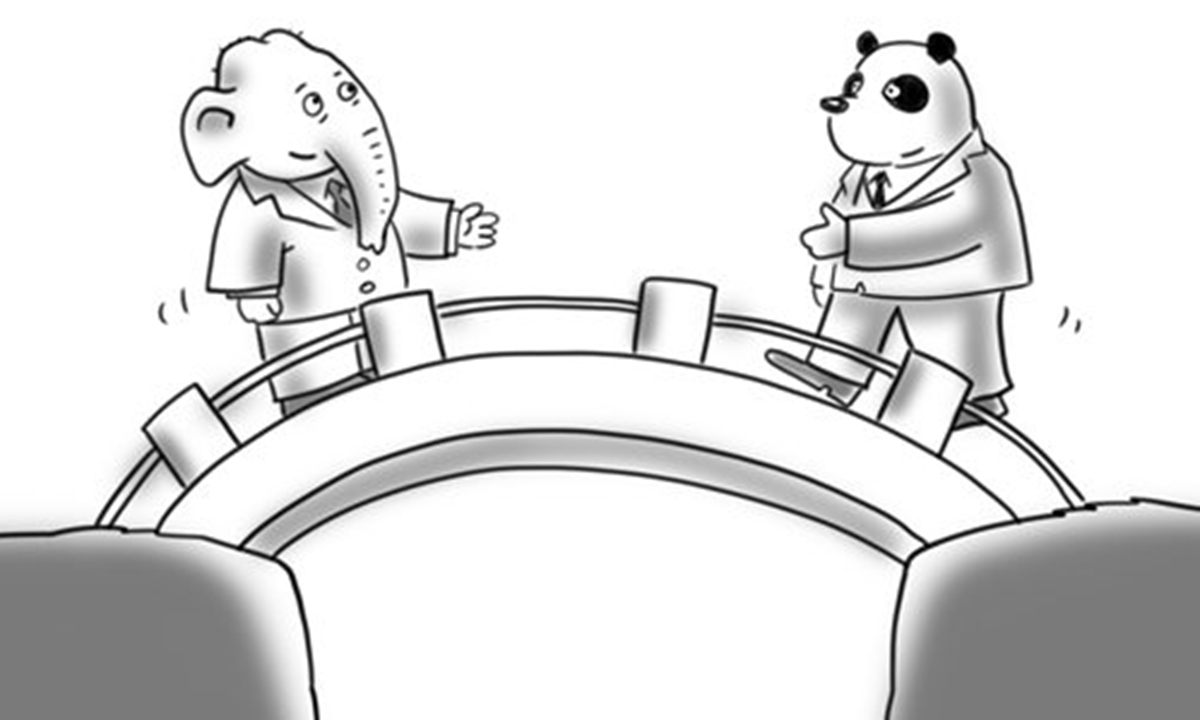How can India understand China better
By Ai Jun Source:Global Times Published: 2020/7/1 22:56:00

Illustration: Liu Rui/GT
What caused the flare up in tensions between China and India? The finger-pointing and nationalist fervor in India have threatened the possibility for both countries to calmly manage their complex relationship.
Against this backdrop, Hindustan Times published an editorial on Monday entitled "To deal with China, understand it better," which, compared to other Indian media which used strident rhetoric toward China, reads rational.
The article said, "India is too dependent on a very limited set of retired diplomats and military officials who have engaged with China, select intelligence officials and diplomats who speak Mandarin, and a small set of academics outside government. This is not tenable."
It points out a way to resolve the crisis - New Delhi needs more people who know how to deal with Beijing. Yet, reading the article, one can feel a severe lack of understanding about China in Indian society, as the article explained "China wants to send a message to India - to accept Chinese dominance in the Asian hierarchy of power… New Delhi cannot do this," so there is a need for a diplomatic reset. And the ultimate goal for the appeal to understand China better is "to battle China."
Such analysis is preposterous. Anyone who is familiar with China's diplomatic principles knows that China's pursuit runs completely counter to anything regarding "dominance" or "hierarchy." Yet the view of the article, in turn, proved how crucial it is for India to understand China better.
Observers acknowledge there are not enough China experts in India. And the limited numbers have been getting to know China through written materials, most of which are edited and published in Western countries with bias. Unfortunately, Indian scholars tend to believe they know China like the back of their hands.
The Indians promoting #BoycottChina on Twitter - be they incumbents or former Indian officials - prove the Indian policymaking circle and elites have an insufficient understanding of China.
The case is also true with media commentators, such as Indrani Bagchi of the Times of India, who suggested on Tuesday that India should "consider holding a Malabar exercise with all four Quad (an alliance among US, India, Australia and Japan) members," "join the Five Eyes network," and promote a free trade agreement with the island of Taiwan.
Sana Hashmi, an Indian scholar, went further. In her article in the Hindustan Times, she said "there could not be a better time for India to engage Taiwan meaningfully," hinting India should consider "formal diplomatic ties" with the island.
It is unclear whether they know what they are talking about, and whether they have a basic understanding of the "one-China" principle. But it is clear Indian media are hyping it for more attention, while Indian politicians are making it appear that the anti-China stance represents public opinion. Indian elites are immersed in their ideological utopia.
India needs to know better that Beijing has no intention to exacerbate relations with New Delhi. Maintaining good-neighborly friendship with countries has been China's traditional policy. India should also understand that China will not give up an inch of its territory. If India constantly makes strategic misjudgments and thinks it could nibble at Chinese soil, China will not sit idly by.
Geographically, China and India share a 2,000-kilometer-long border, yet, psychologically, the two peoples seem far away from each other. What a pity.
The Hindustan Times is right about one thing: India does need more people who know China better. But this should not be aimed at battling China, but at efficient communication that could lead to a resolution.
Posted in: OBSERVER